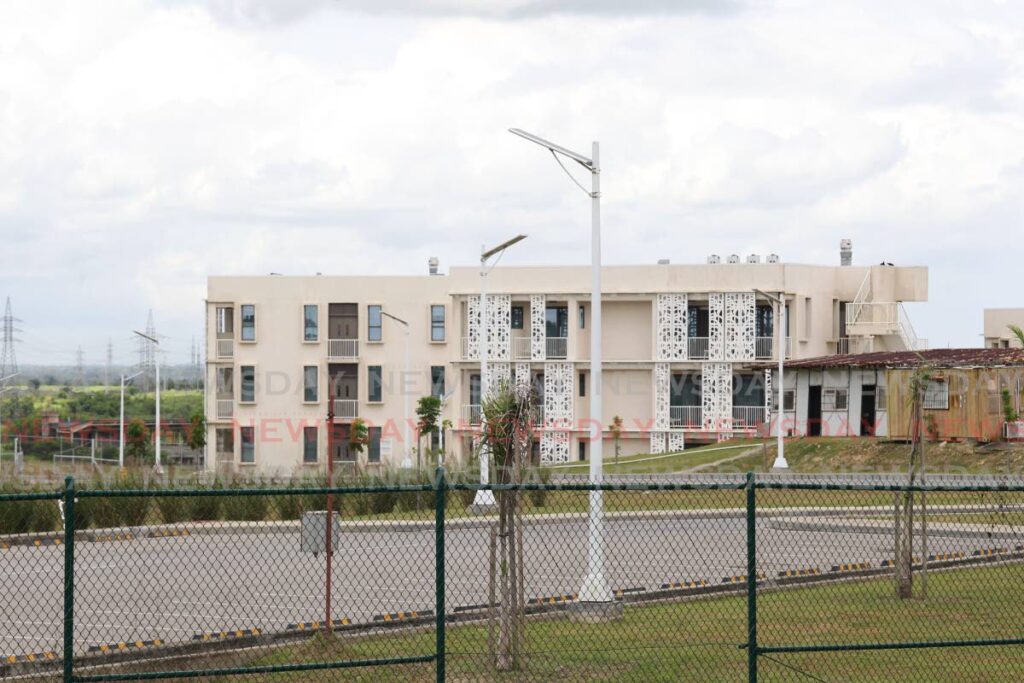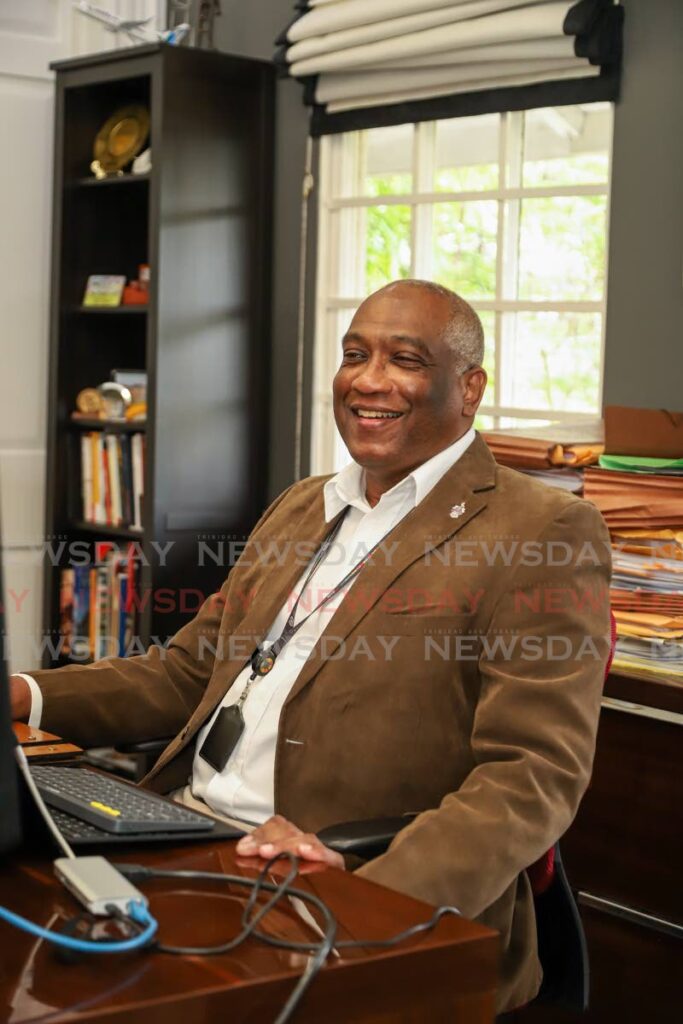UWI principal: Focus on productive, fulfilled graduates

As UWI St Augustine campus principal Prof Brian Copeland looks forward to retiring on July 31, he said the focus of the university’s Vision 2030 should be to produce graduates who can contribute to the nation and region while also living fulfilling lives.
Copeland said when he became principal in 2018, he asked the administration why it was important to educate people, as well as what direction the university should take. He said after exploring globally, he came up with four reasons a population should be educated.
“One, to prepare them for survival, and that was in 2016, and well with covid19 and natural disasters, when society’s connections fail how do you survive at different levels? I don’t think we’re doing enough of that, and I’m glad to see the government is now looking at introducing national service.
"Two is to prepare them for the world of work, three is to prepare them for the world of work of the future, growing in the social space, and the fourth is about building yourself as a person, exploring interests outside of the workplace. Based on this you build whole systems. We started to look at the future and what we wanted 2030 to look like in terms of delivery, staffing, quality of content we deliver, funding, etc.”
He said while the university aimed to produce graduates who were competent in their academic discipline, there were seven other attributes of an ideal graduate that should be nurtured.
“They should be a critical and creative thinker, an effective communicator with good interpersonal skills, skilled in information technology and information literate, innovative and entrepreneurial, globally aware and well-grounded in regional identity, socially, culturally and environmentally responsible, and guided by strong ethical values. As a university, we are supposed to be strategically building a society. We want to produce well-rounded people, so we are looking at incorporating the different disciplines into the curricula of the courses we offer, so that, for example, science students will be exposed to the Humanities and Social Sciences, and vice versa.”
He said his experience as an engineer enabled him to process map the systems at the university to determine where gaps were in its processes and services, and use those to determine the university’s focus in implementing programmes.
Copeland said while he received a lot of flack for saying that the campus should operate as a business, he viewed it not as a profit-driven business, but one which had objectives to achieve at a certain cost that had to be balanced systematically.
“It’s not a business in a true sense but we have to think like one, and that has to do with accountability. We adopted a mindset from the University of London and just went on.”
He said one of the projects which showed potential for significantly increased earnings was the UWI South campus, Debe, which has been reconfigured to become the UWI Global School of Medicine.

“The campus cost $600 million to complete after the contractors defaulted, $500 million from the government and $100 million from UWI. We will be attracting full fee-paying foreign students from the US who can access scholarships from their country to study abroad. We’re looking at taking in 150-180 students per year, and that school would be able to fund 25 per cent of UWI’s current expenditure, which is huge. We’ve asked the government to help us facilitate setting up agreements with the US government, as well as a one-time payment of $20 million to finish setting up the programme. We asked in August and still haven’t heard anything.”
He said the programme offered at the UWI South campus will be geared towards public and global health. He said the campus was in a convenient location to access the teaching hospitals at San Fernando and Couva, as well as Mt Hope.
Copeland said when the university reopens to students in September, deans, heads of departments, and lecturers will have the responsibility of determining how their courses are taught on a spectrum ranging from full face-to-face classes to fully online courses. He said they were asked to make the decisions and inform the students early so they could make decisions about housing, travel, etc.
He said the endowment fund committee will be reaching out to corporate and other sponsors to increase the level of funding that can be provided to the university.
He said regional students would be given priority to be accommodated in the halls of residence, while students from TT could choose to attend classes in-person or virtually based on their schedules.
“We’re looking at an option called high-flex, where there is a small subset of the class in front of the lecturer, while the rest are online, and the lecturer can respond to questions from both sets of students. This will require classroom development, infrastructure, and staff development. The Centre for Excellence in Teaching and Learning is carrying out training workshops, and once we’ve got everything in place we will carry out the process of getting accreditation for the courses based on the change in delivery. We will be reviewing a lot of the regulations around courses because covid19 really opened our eyes about which ones were useful and which ones were not.”
Copeland said the campus was concerned about the threats posed to the region by climate change and its effects on food security. He said the university had recently instituted a bachelor's of science in disaster risk for agriculture, a master's in food security, and a doctorate in renewable energy technology.
“We’ve asked ourselves what we’re doing to impact the nation’s ability to feed itself. We’re dealing with a population that has a stigma against non-traditional careers like agriculture, the arts, culture, etc. The faculty, which is our oldest, recently had a change in leadership and we’ve begun to engage the population. We as a nation are not feeding ourselves and we need to do that if we want to survive.
“When the faculty started, 100 years ago this year, graduates used to be given a plot of land for a year to grow things and develop their skills, so we’re looking at reviving that initiative with some land we have in Orange Grove (Tacarigua). We are also planning to set up solar farms to create renewable energy.”
Copeland said research was an important component of any university, as this separated it from any other teaching and learning institution. He said UWI had set up an ecosystem where spinoff companies would be developed based on research carried out by students and faculty. The three companies that have been formed so far are UWI Fine Cocoa Products Ltd, UWI Seal It Ltd, and PHI Innovations Ltd.
He said one of the key aspects in achieving the university’s vision 2030 is to educate the public about the role of the institution and the role of research as a viable option for a career. He noted that tertiary education is changing to develop people physically and mentally over time.
“We think a person is an asset, and so to have them be a benefit to society, we have to develop their mind and body. In addition, graduates should have a network to plug into when they leave, where alumni help them plan their lives after UWI so they are not lost when trying to find a job.
Most people don’t think about research as a career, and it is the least understood part of the university. We need to educate people a lot more about what the university is doing, especially with the new companies we are forming. We realise that people will not be happy in jobs that don’t fulfil them, so hopefully helping them form their own companies with supporting infrastructure will create more fulfilled people who will contribute to the nation. A problem we have is that research often doesn’t have immediate results.”
Copeland said the university also needed to reach out to potential students to educate them about possible career choices and how going to university could help them achieve those. He said the university was carrying out many projects in the communities around it, but it was not doing well in informing the public about what it was doing.
He said he is looking forward to retirement, where he plans to work on sound system installation and catch up on his reading. He said his vision for the university was that it would operate as a business to generate its own funding and create productive graduates who can establish a rewarding life.
“Research has to be meaningful and extricate maximum value for the nation. I would like to see the creation of a new small and medium enterprise sector with the spinoff companies which can attract 30-40 per cent of the foreign exchange coming. We want to do a total redesign for the maximum efficiency of administration.
“I also want to see us have a much stronger bond with the public because we haven’t done enough community engagement programmes. We also need to be able to speak to people on their own level and show them how the research we are doing will help them.”


Comments
"UWI principal: Focus on productive, fulfilled graduates"